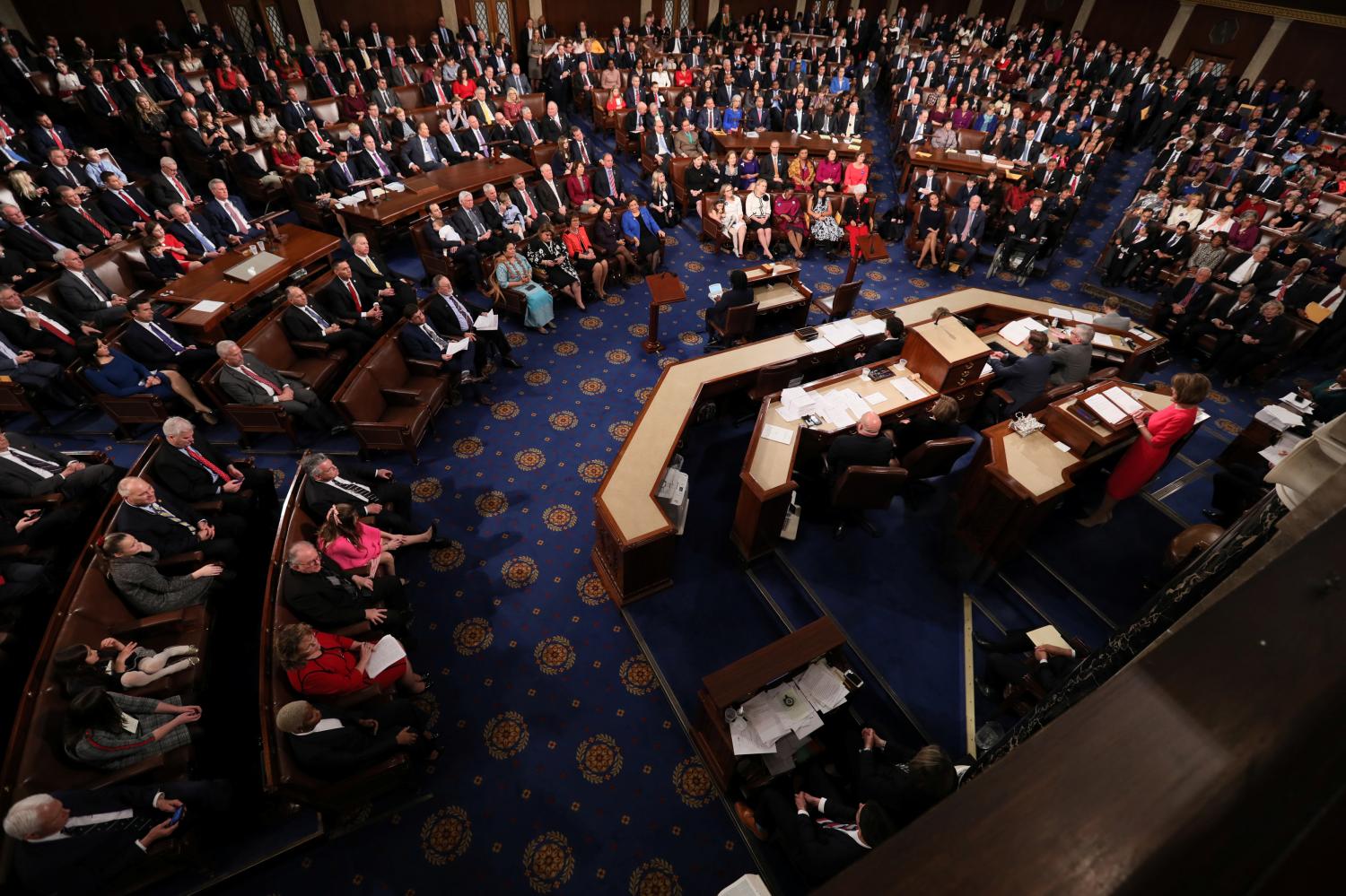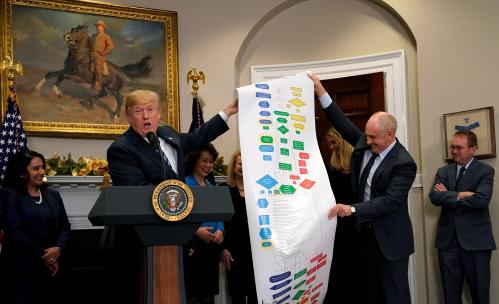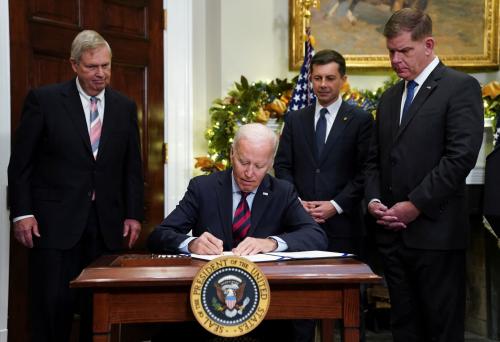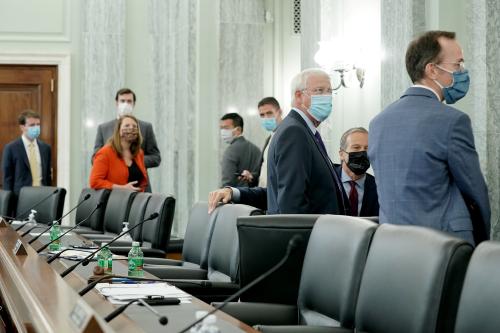This report is part of the Series on Regulatory Process and Perspective and was produced by the Brookings Center on Regulation and Markets.
How closely does Congress oversee the regulatory process? Each year, federal agencies publish thousands of regulations in the Federal Register, but Congress rarely holds hearings, conducts investigations, or passes legislation involving them. The vast majority advance without so much as a sniff from Congress. Each congress, numerous bills are introduced to reform the regulatory process. Although these bills rarely pass, most of them aim to increase Congress’s oversight role in the rulemaking process. The overarching implication from these two observations is clear: Congress either cannot or does not fulfill its duty to oversee rulemaking by the executive branch.
Upon closer investigation, however, congressional oversight may be more robust than it initially appears. Recent scholarship has investigated congressional oversight via letters sent by members of Congress directly to agencies. These letters express members’ (or their constituents’) views on agency policy actions, ranging from constituent casework to matters of trade policy. This form of oversight is much less visible than traditional oversight, but it has its advantages. Members of Congress can write a letter unilaterally, meaning they don’t need to rally others to the cause (as they do with, say, scheduling a committee hearing). It also is relatively quick; compared with the time to draft a bill, writing a letter is much less time-intensive.
How vigorously does Congress use comment letters to oversee the notice-and-comment rulemaking process? To answer this question, my colleague Kenneth Lowande and I studied comments submitted by members of Congress to the Environmental Protection Agency (EPA) on 35 proposed rules published between 2007 and 2017. Here’s what we learned:
1. Congress occasionally gives close scrutiny to EPA’s high-profile rules, but overall this form of oversight is not systematic.
In our sample of rules, Members of Congress made all manner of requests to the EPA during the public comment period. Most frequently, member letters featured policy requests, including letters commending the agency for taking the action in the first place, urging the agency to change the policy before the final rule stage, or requesting the agency to altogether withdraw the proposal. Sometimes members of Congress teamed up and sent the agency a letter signed by multiple members, usually from the same party. As the excerpt from Senator Tom Carper’s (D-DE) letter in Figure 1 below illustrates, some letters included personal appeals.
Figure 1. Example of Personal Appeal to EPA from Member of Congress
 Note: Excerpt from letter from Sen. Carper to Administrator Johnson commenting on EPA’s 2007 ozone standards. “I’m sure you’re receiving a lot of pressure to go the other way on this one. Please don’t do that and you’ll make possible a healthier New Year for a lot of Americans. Merry Christmas to you and the Johnson family!”
Note: Excerpt from letter from Sen. Carper to Administrator Johnson commenting on EPA’s 2007 ozone standards. “I’m sure you’re receiving a lot of pressure to go the other way on this one. Please don’t do that and you’ll make possible a healthier New Year for a lot of Americans. Merry Christmas to you and the Johnson family!”
Another category of comments is what we call “procedural requests,” where members asked the agency to extend the length of the rule’s public comment period, host additional public hearings, conduct additional analyses about the rule, or provide more evidence.
Overall, while the content of the comments suggested Congress engages in substantive oversight of the EPA’s regulatory actions, the frequency of congressional letters was less reassuring. On any individual rule, the average member of Congress had a 5% chance of submitting a substantive letter to the EPA and a much lower chance—less than 1%—of submitting a procedural comment.
2. Ideological disagreement is a key driver of member commenting behavior.
Our analysis also looked at which members of Congress were most likely to submit a comment on the EPA’s rulemakings. Members of the House were no more likely, statistically speaking, than senators to write a letter to the EPA. Perhaps unsurprisingly, we also found that members on the agency’s oversight committee were more likely to submit a comment than other members.
One key finding is that ideological disagreement drove much of members’ commenting behavior.[1] Our analysis revealed that, compared to members who we predicted to be ideologically aligned with the proposal, members who were the most ideologically opposed to the agency’s proposal were 3% more likely to write to the agency. This represents a substantively large increase in the likelihood of commenting—a nearly 60% increase over the baseline expectation. These results suggest that members are using comment letters to convey meaningful information about their policy preferences.
Additionally, our results showed that ideology was behind not only substantive letters, but also procedural ones. That is, the members who wrote to the EPA asking for, say, a longer public comment period, were those were most ideologically distant from the proposal itself. This ideological motivation suggests that procedural objections may be a way for members to strategically obstruct the agency’s policymaking process.[2] After all, extending the public comment period on a rulemaking proposal means the agency is held up both by the additional time granted for comment and by the requirement to respond to additional comments.
3. Congressional staff are an important resource when it comes to submitting comments.
We expected congressional staff to be deeply involved in the drafting of members’ rulemaking letters. After all, Members of Congress have many demands placed on their time, from fundraising to town halls to floor votes to media interviews to impeachment hearings. To conduct oversight of agency rules a member needs an experienced staff to research the issue and write the letter. Specifically, we looked at the overall expertise housed in a Congress member’s staff, by calculating the median number of years of service in Congress among staffers in each office.
Our analysis revealed that members with more experienced staffs are more likely to submit both substantive and procedural comments; however, this result is conditioned on how much the member disagreed with the agency’s proposal. In other words, both substantive and procedural comments were most likely to come from members who had the incentive (i.e., they disagreed ideologically with the proposal) and the know how (i.e., they have an experienced staff with the substantive and procedural proficiency to execute a comment).
Overall, our study shows that Congress engages in oversight of agency regulations through comment letters. Compared to the ways that we typically conceive of congressional oversight—hearings, investigations, bill introductions, floor debates, etc.—this form of oversight is under explored, but just as important. Additionally, the results contribute to an ongoing conversation about the critical importance of staff to the overall effectiveness of Congress.
Of course, there are important caveats worth noting. First, our study focuses only on the EPA, an agency that has an active (and often politically contentious) regulatory agenda; oversight may not be as vigorous at other agencies that have less prominent regulatory agendas. Second, oversight conducted in this manner is necessarily ex post (i.e., it occurs after the agency has drafted a detailed policy proposal). Drafting a proposed regulation is a significant investment of time and resources and, as a result, agencies may be reluctant to make major changes to a proposal at this stage. This suggests that oversight at this stage may be less effective at eliciting substantive policy reforms than if a member worked with an agency earlier on the process.
The author did not receive financial support from any firm or person for this article or from any firm or person with a financial or political interest in this article. She is currently not an officer, director, or board member of any organization with an interest in this article.





